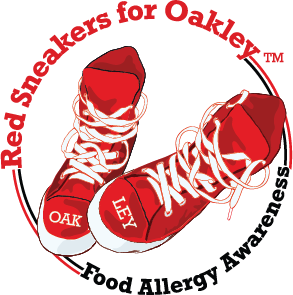Oakley’s Story
OAKLEY DEBBS WOULD BE 20 YEARS OLD NOW.
In 2016, the Debbs family was on a Thanksgiving family vacation with all of their relatives in Maine. That day was unique, as all 7 of Oakley’s cousins, his twin sister, all of his aunts’ and uncles, his parents, and his grandmother were together; all of his living relatives except for his grandmother in Florida. Oakley was 11 years old at the time.
The day was idyllic. Beautiful and sunny, but cold. The family filled the entire day with Oakley’s favorite activities: family paddle tennis, jumping around a trampoline park, and finally having dinner together in Portland with his family. The food was spicy BBQ and Oakley did not eat it. As a result, he was still very hungry when he returned home and was playing with his cousins.
On the counter sat a coffee cake that came in a Honey Baked Ham gift basket sent to help feed the family over the weekend. The cake was not bought by the Debbs family. It was an ancillary item. The cake did not contain visible nuts on the exterior but it was unknowingly made with walnut extract.
While rushing by the counter, Oakley and his cousins grabbed a piece of the cake. Oakley had one bite.
He would never eat something that knowingly contained nuts. Oakley was allergic to tree nuts.
He went out to play again for over an hour with his cousins, and then his mother told him it was time to go to bed. He went inside, took a shower, brushed his teeth, and got ready for bed. While getting ready for bed, Oakley mentioned to his mom that he was having some pain in his chest, but his breathing was fine.
Oakley wasn’t asleep for long before he came to his parents’ room, complaining of a stomach ache, and suddenly he started to vomit. After vomiting, he said he felt better, and his mother assumed that whatever was making him sick had “come up” and everything would be okay. He climbed into bed with his parents.
He then began to vomit again. He was rushed to the bathroom where his breathing was deteriorating. His mother set up his nebulizer and gave him prednisone as she had done countless times before.
Oakley suffered from major asthma and had continuous attacks, daily, weekly. It was a constant battle. He had been hospitalized and put on a breathing machine two times before and spent time in the ICU. He had never been hospitalized from ingesting a food allergen, only from having a severe asthma attack. Their emergency response plan was always to keep Oakley breathing. It never contained any reference to his food allergies. He was told he had a “mild” allergy to nuts.
He continued to play, but after a few minutes, he felt strange. Realizing that the cake may have contained nuts, Oakley went to his mom, Merrill, and said, “Mommy, I think I ate a nut.” Merrill tasted the cake and detected a nut flavor. His mother got very worried and started to panic. Oakley said he felt fine and not to worry but he developed a single hive on his lip. His mom put him on her lap and told him to sit. She was very worried. After some time, she gave him Benadryl in pill form and the hive disappeared.
Not long after that, everything would change.
Things began to deteriorate fast. He was crying and he knew that something was wrong. Oakley cried out, “Call 911!”. His mother raced to the phone. Oakley then said, “I don't want to die!”. He was screaming.
He jumped into his father’s lap and fell unconscious. He went limp and turned blue. Life left his body.
His father got up and screamed for help. His grandmother started administering CPR.
The first responders arrived quickly but Oakley’s blood pressure had dropped, he had unknowingly suffered a heart attack and was not breathing. They did not administer CPR or carry epinephrine. Nothing was accomplished.
The EMTs arrived 15 minutes later. They did not carry epinephrine either, but they began to administer CPR and used defibrillators to get his heart beating again. The Debbs were rushed to the local ER in Kennebunkport where they kept Oakley breathing. They decided to transport him to Portland Children's Hospital. The family was immediately ushered into a family room, outside the main waiting area. It was not a good sign.
While in the waiting room, the Debbs received a phone call from a medium in California who said she had been contacted by Oakley. He wanted his mom to know that he loved his red sneakers, they were his favorite present. He wanted her to know he was sorry for eating the cake. He didn’t know it had nuts. He wanted everyone to know he was OK. It was no one’s fault, it was meant to be.
Then a nurse came into the room and asked to speak to his father. She explained that Oakley’s blood oxygen saturation level was at a point where people couldn’t survive. He was beyond coming back. The oxygen had been out of his organs for too long and Oakley would not be able to breathe again on his own. He had died from an anaphylactic shock to his food allergy. In fact, it was the first time the Debbs family had heard or understood the word “anaphylaxis”. The nurse explained the time frame between his last breath and getting his heart to beat again was too long, even though he was breathing. He was brain-dead and oxygen had stopped flowing to his organs.
The Debbs contacted every expert and researched every possible solution. There was an outpouring of support from friends and family. Everyone had a solution. People offered to have him helivaced to Boston Children’s Hospital. They were slowly learning the chances of surviving a severe anaphylactic shock and losing consciousness, then coming back are very slim. No one had ever survived at his current blood oxygen saturation level. The family kept Oakley on a ventilator for four days.
Looking for a glimmer of hope, a decision was made to conduct a nuclear brain scan to see if there were ANY signs of life. The results came back and there were none. It was a totally black screen. There was no need to go to Boston. They were advised to stop the ventilator.
Oakley Debbs had passed. He actually had passed in his father’s arms that night four days ago. His father knew it but couldn’t come to terms with it or disappoint his family.
The day after Oakley got his angel wings, Oakley’s parents, Robert and Merrill Debbs sat in the hospital thinking, “How could this possibly have happened to our child? Our loving, wonderful, perfect boy.” It was heart breaking, earth-shattering; it was inconceivable.
While grieving, Oakley’s aunt had posted about the tragedy to friends and family and was amazed at the immediate response to the post. It had reached thousands, with people reposting and sharing with their friends and groups. So many questions. So much concern. The Debbs family was shocked to find out there was such a large food allergy community of people who were diligently doing whatever they could do to keep themselves or their family members safe.
The next day, Mr. Debbs was contacted by another parent who lost his daughter to anaphylaxis. He thought, “This happens to other people? How?”
The Debbs immediately realized that there was a need for greater education and advocacy in this area. Then they decided they had to do something to prevent this from happening to anyone else. They wanted to educate and advocate for food allergy awareness and help save lives.
Oakley’s mother and aunt thought about how much Oakley loved his red sneakers and how much he wanted to always wear them. He wore them the day he passed, and he was buried in them. Who knew this early holiday present from his mom would become so meaningful?
The entire family unilaterally decided to use red sneakers as a powerful symbol of the need for greater education and awareness about food allergies.
The Debbs created a non-profit 501c3 organization to prevent what happened to Oakley from happening to another individual. They called it Red Sneakers for Oakley.
It is still going strong, many years after Oakley’s death in 2016. Red Sneakers for Oakley has reached millions of people and continues to save lives.
LESSONS LEARNED
The Debbs feel they were not adequately informed of the risks of food allergies by their allergist’s office. They had been to several specialists including four different allergists in West Palm Beach, Miami, and New York.
Every doctor was concerned about Oakley's life-threatening asthma and keeping a plan that revolved around his asthma and breathing. Not his food allergy. The Debbs had never heard of the noun anaphylaxis — or understood the definition — until that fatal night.
Oakley had been hospitalized after severe asthma attacks before. He had been in the ICU for over 10 days two separate times, but perhaps this tragedy could have been prevented if doctors had emphasized the dangers of food allergies as well as suffering from severe asthma.
Oakley had not been prescribed an epinephrine auto-injector since 2012 when his expired. The Debbs report that they were not told to carry one nor had they been trained in how or when to use one. They were told to use antihistamines, such as Benadryl, as Oakley’s food allergies were “minor.”
They were not aware that antihistamines (Benadryl), do not stop systemic symptoms, and that epinephrine is the ONLY effective first-line treatment of anaphylaxis.
They were also not aware that exercise prior to ingesting an allergen has been found to exacerbate food allergy reactions. It is described as a cofactor, along with asthma. Other cofactors likely included extreme cold air temperatures and an empty stomach.
KEY TAKEAWAYS
In the event of anaphylaxis, Epi First Epi Fast, then call 911.
Symptoms of anaphylaxis can take more than an hour to manifest.
Food allergy reaction symptoms, such as difficulty breathing, can often be mistaken for asthma symptoms.
Asthma is a cofactor that can affect the severity of a food allergy reaction.
Exercise prior to ingesting an allergen has been found to exacerbate food allergy reactions. It is described as a cofactor.
Extreme temperatures is also a cofactor.
Consuming the allergen on an empty stomach may affect the severity of a reaction.
Prior food allergy reactions are not indicative of future reactions’ severity.
When symptoms relating to two bodily systems manifest themselves after ingesting an allergen, use epinephrine. For example, hives along with vomiting, or hives with trouble breathing, are possible indicators of the onset of anaphylaxis.
Anaphylaxis can present itself without hives.
Epinephrine is the only first-line medication for anaphylaxis. Other medicines such as antihistamines (e.g., Benadryl) might help for hives, but they cannot treat anaphylaxis.
Always carry two epinephrine auto-injectors. Sometimes a second dose is needed.
In most cases of fatal food allergy reactions, there was either a delay in giving epinephrine, or it was not given at all.
Read labels, every time. If there is no label, like with a food product from a gift basket, do not take a risk.
Make sure your allergist gives you the information you need to prepare an Emergency Action Plan, and keep it updated.
Other co-factors (that did not affect Oakley) include acute infections, drugs [non-steroidal anti-inflammatory drugs (NSAIDs), proton pump inhibitors], alcohol, and menstruation, as well as psychological factors (e.g., emotional stress) or specific allergens.






